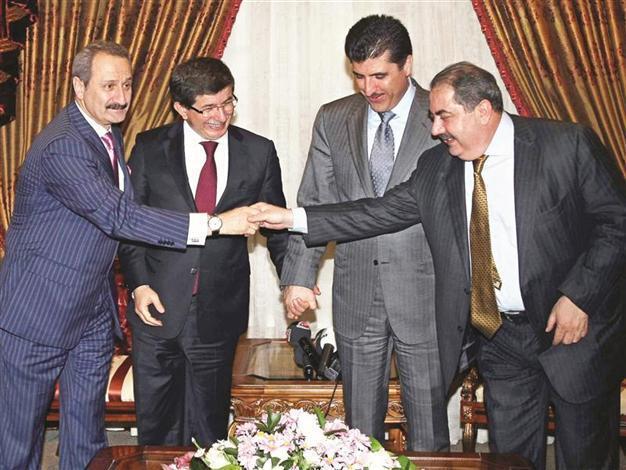Turkey’s focus ‘shifts’ from Syria to Baghdad
WASHINGTON

Economy Minister Zafer Çağlayan (L) shakes hand with Iraqi FM Zebari (R) as FM Davutoğlu (2nd L) and KRG PM Barzai looks in this 2009 photo. Former US ambassador to Turkey, Jeffrey (inset), said there is clearly a difference of views on Iraq with Ankara. Hürriyet photo
Turkey’s focus in Washington is shifting to Iraq from Syria, according to Jim Jeffrey, former U.S. Ambassador to Iraq and Turkey, due to the Obama administration’s reluctance to intervene in the Syrian crisis.Jeffrey said there were several reasons behind Turkish-Iraqi relations shadowing the Syria issue; notably that Iraq is now a potential source of stability, as opposed to previous years, as well as a major oil exporter, already the second-largest at OPEC and competing with Saudi Arabia.
The first signs of the U.S. administration’s stance toward Syria came during Obama’s inauguration speech. President Obama said the decade of war is over and then, when he gave an exclusive interview to The New Republic’s editors, he made his hesitations toward Syria clear by expressing some tough questions on his options: “In a situation like Syria, I have to ask, can we make a difference in that situation? Would a military intervention have an impact? How would it affect our ability to support troops who are still in Afghanistan? What would be the aftermath of our involvement on the ground? Could it trigger even worse violence or the use of chemical weapons? What offers the best prospect of a stable post-Assad regime? And how do I weigh tens of thousands who’ve been killed in Syria versus the tens of thousands who are currently being killed in the Congo?’”
Jeffrey said he interpreted Obama’s statements to suggest an end to long-term, massive ground wars that fight the very population of a country and are designed to nation-build.
“He is absolutely right. That period is over. Because it was not particularly successful,” Jeffrey said.
Agreement on Iraq’s stability
While discussing the challenges in Syria with his counterpart at the State Department, Sinirlioğlu also met twice with Ambassador Carlos Pascual, the State Department’s Special Envoy and Coordinator for International Energy Affairs. Diplomatic sources have confirmed that energy deals in Northern Iraq made between Turkish companies and the Kurdistan Regional Government (KRG) were one of the top topics on the agenda.
Jeffrey said Washington is working with all parties to solve the crisis between the central government and the KRG.
“Sooner or later, hydrocarbons will be exported out of northern Iraq. The question is whether that would be done in cooperation with Baghdad, and thus reinforcing the unity and federal system in Iraq, or whether that would be done in another, maybe less-helpful, way. The U.S. is working with all parties to try to come up with a way forward that has everybody involved,” the ex-envoy said.
However, he painted a starker picture of the future. “We tried that in the past and it failed. A major reason behind the failure has been Baghdad’s lack of cooperation, including not paying the second [installment] of payments to the companies in the north. Everybody knows that Turkey and the U.S. are in agreement on the unity and stability of Iraq. But there is clearly a difference of views on some of the specifics, including oil,” Jeffrey said.
















